Games for Teaching Greek and Latin Roots
Teaching Greek and Latin Roots with Games
Greek and Latin roots are not only taught in Greek and Latin classrooms. English, Science, and Humanities classes use the knowledge of Greek and Latin roots in their vocabulary. Most English and Science classes have a full unit on Greek and Latin roots at the beginning of the year to initiate students into the method of deciphering words by using Greek and Latin roots.
The Importance of Learning Greek and Latin Roots
Understanding Greek and Latin roots is crucial for building a strong vocabulary and improving language skills. These roots form the foundation of many words in the English language, and by learning them, you can easily decipher the meanings of unfamiliar words. Whether you're a student preparing for standardized tests or simply looking to expand your knowledge, learning Greek and Latin roots can greatly enhance your language abilities.
In Latin class, I focus on Etymology each time we learn a new set of vocabulary, but I also host an Etymology club that studies roots of words outside of class. Because Greek roots are so common in English vocabulary (and because they’re just plain FUN), I also devote a week of class to GREEK roots!
Use these reference charts to help teach Greek and Latin roots! Common Greek and Latin roots include:
Because I believe in game-based learning and have experienced its success first-hand, I wanted to create resources so that my students could learn and review their knowledge through Greek and Latin roots games.
My Favorite Greek and Latin Roots Games include:
Benefits of play-based learning and assessment:
Teachers play the role of observer and encourager rather than the font of knowledge. Students benefit from being situated as the source of knowledge.
In the Google Slides Greek and Latin roots video game, students work independently
With guided notes and Google Slides, students can either work independently or as a whole group with teacher instruction
In the digital escape room, students work collaboratively
Student engagement increases when teachers implement colorful games, technology, and intangible prizes that are knowledge and merit based.
When students enjoy the process of practicing and retaining information, they are more likely to remember it.
Game-based learning and assessments increase student determination and grit. They have an incentive to try again if they don’t get an answer right the first time.
How to Use Greek and Latin Roots Games:
Guided Notes need to be printed out for students, or assigned online. Then, either share the Google Slides with students so they can fill them out independently, or go through them as a class!
Google Slides Video Games require no prep. Students receive the link from their teacher, and they review Greek and Latin roots by clicking through the game on their device!
Greek and Latin Roots digital escape is also very independent. When I use it in my class, I give the link to students and only give 3 hints throughout the entire period. I always keep a teacher answer key printed, so I can help students if they need it.
Have fun teaching Greek and Latin roots!
Previewing Greek and Latin Roots Games:
Any of these resources mentioned can be purchased in my online store here.
More Greek and Latin Roots Game Ideas:
Word Building Race: Give each child a set of root word cards and have them race to create as many words as possible using the roots.
Root Word Puzzles: Create puzzles where kids have to piece together root words and their meanings.
Root Word Charades: Act out root words and have kids guess the meaning.








